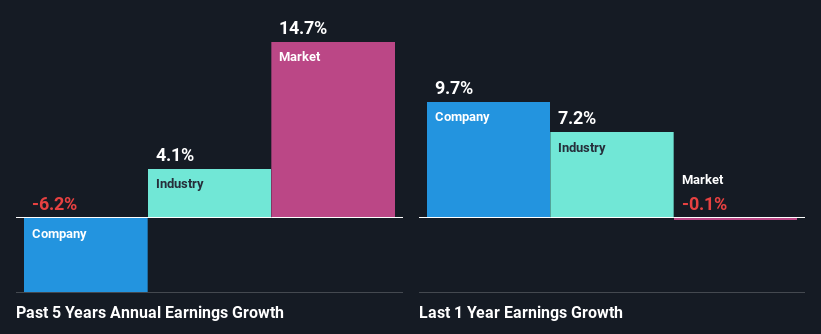Qube Holdings Limited's (ASX:QUB) Stock Is Rallying But Financials Look Ambiguous: Will The Momentum Continue?
Most readers would already be aware that Qube Holdings' (ASX:QUB) stock increased significantly by 10% over the past three months. However, we wonder if the company's inconsistent financials would have any adverse impact on the current share price momentum. Particularly, we will be paying attention to Qube Holdings' ROE today.
Return on Equity or ROE is a test of how effectively a company is growing its value and managing investors’ money. In simpler terms, it measures the profitability of a company in relation to shareholder's equity.
See our latest analysis for Qube Holdings
How To Calculate Return On Equity?
The formula for return on equity is:
Return on Equity = Net Profit (from continuing operations) ÷ Shareholders' Equity
So, based on the above formula, the ROE for Qube Holdings is:
6.0% = AU$184m ÷ AU$3.1b (Based on the trailing twelve months to December 2023).
The 'return' is the income the business earned over the last year. So, this means that for every A$1 of its shareholder's investments, the company generates a profit of A$0.06.
What Has ROE Got To Do With Earnings Growth?
So far, we've learned that ROE is a measure of a company's profitability. We now need to evaluate how much profit the company reinvests or "retains" for future growth which then gives us an idea about the growth potential of the company. Assuming all else is equal, companies that have both a higher return on equity and higher profit retention are usually the ones that have a higher growth rate when compared to companies that don't have the same features.
A Side By Side comparison of Qube Holdings' Earnings Growth And 6.0% ROE
At first glance, Qube Holdings' ROE doesn't look very promising. However, the fact that the its ROE is quite higher to the industry average of 4.8% doesn't go unnoticed by us. But seeing Qube Holdings' five year net income decline of 6.2% over the past five years, we might rethink that. Bear in mind, the company does have a slightly low ROE. It is just that the industry ROE is lower. Therefore, the decline in earnings could also be the result of this.
However, when we compared Qube Holdings' growth with the industry we found that while the company's earnings have been shrinking, the industry has seen an earnings growth of 4.1% in the same period. This is quite worrisome.
Earnings growth is an important metric to consider when valuing a stock. It’s important for an investor to know whether the market has priced in the company's expected earnings growth (or decline). This then helps them determine if the stock is placed for a bright or bleak future. If you're wondering about Qube Holdings''s valuation, check out this gauge of its price-to-earnings ratio, as compared to its industry.
Is Qube Holdings Efficiently Re-investing Its Profits?
With a high three-year median payout ratio of 81% (implying that 19% of the profits are retained), most of Qube Holdings' profits are being paid to shareholders, which explains the company's shrinking earnings. With only a little being reinvested into the business, earnings growth would obviously be low or non-existent.
In addition, Qube Holdings has been paying dividends over a period of at least ten years suggesting that keeping up dividend payments is way more important to the management even if it comes at the cost of business growth. Our latest analyst data shows that the future payout ratio of the company is expected to drop to 64% over the next three years. As a result, the expected drop in Qube Holdings' payout ratio explains the anticipated rise in the company's future ROE to 8.5%, over the same period.
Summary
On the whole, we feel that the performance shown by Qube Holdings can be open to many interpretations. Specifically, the low earnings growth is a bit concerning, especially given that the company has a respectable rate of return. Investors may have benefitted, had the company been reinvesting more of its earnings. As discussed earlier, the company is retaining a small portion of its profits. That being so, the latest industry analyst forecasts show that the analysts are expecting to see a huge improvement in the company's earnings growth rate. To know more about the latest analysts predictions for the company, check out this visualization of analyst forecasts for the company.
Have feedback on this article? Concerned about the content? Get in touch with us directly. Alternatively, email editorial-team (at) simplywallst.com.
This article by Simply Wall St is general in nature. We provide commentary based on historical data and analyst forecasts only using an unbiased methodology and our articles are not intended to be financial advice. It does not constitute a recommendation to buy or sell any stock, and does not take account of your objectives, or your financial situation. We aim to bring you long-term focused analysis driven by fundamental data. Note that our analysis may not factor in the latest price-sensitive company announcements or qualitative material. Simply Wall St has no position in any stocks mentioned.

 Yahoo Finance
Yahoo Finance 
